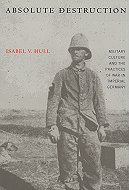|
Absolute Destruction: Military Culture and the Practice of War in Imperial Germany
|
|
Isabel V. Hull
|

|

From the Introduction
This is a study of institutional extremism. It examines the German conduct of war from 1870 through 1918. In engagements large and small, in Europe and in the colonies, the imperial German military repeatedly resorted to terrific violence and destruction in excess of Germany's own security requirements or political goals, in contravention of international norms, and even contrary to ultimate military effectiveness. Routine German military operations developed a dynamic of extremism that could, and did, lead to extermination of civilian populations in the colonies and that characterized German practices in occupied Europe during the First World War.
Military extremism is the repeated and unlimited application of the military's expertise, that is, the use of violence… Extremism occurs when the means overwhelms the end, when violence is pursued because the institution keeps on generating violence according to quasi-automatic mechanisms. Following necessary-seeming routines, military extremism gravitates toward final, or total, solutions…We usually think of the extremism of "final solutions", especially when they end in genocide, as the result of ideology…
This book is the story of how the means overwhelmed the ends, indeed, became the ends. Its focus is therefore not on ideology but on military practices and the basics assumption behind them. These habitual practices, default programs, hidden assumptions, and unreflected cognitive frames I understand in an anthropological and organizational-cultural sense as Military Culture.
This book has three parts. The first reveals the pattern of extremism, even genocidal, conduct of war as it developed in the course of one engagement, in Southwest Africa. The second analyzes that pattern as the result of Germany's military culture. The third shows how the pattern continued to intensify in the First World War.
Isabel V. Hull is John Stambaugh Professor of History at Cornell University. She is the author of Sexuality, State and Civil Society in Germany, 1700-1815 (also from Cornell) and The Entourage of Kaiser Wilhelm II, 1888-1918, and the coeditor of German Nationalism and the European Response, 1890-1945
|
|
